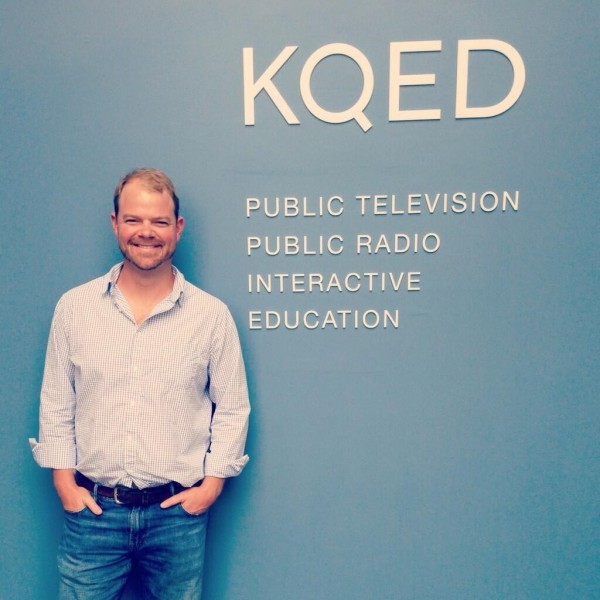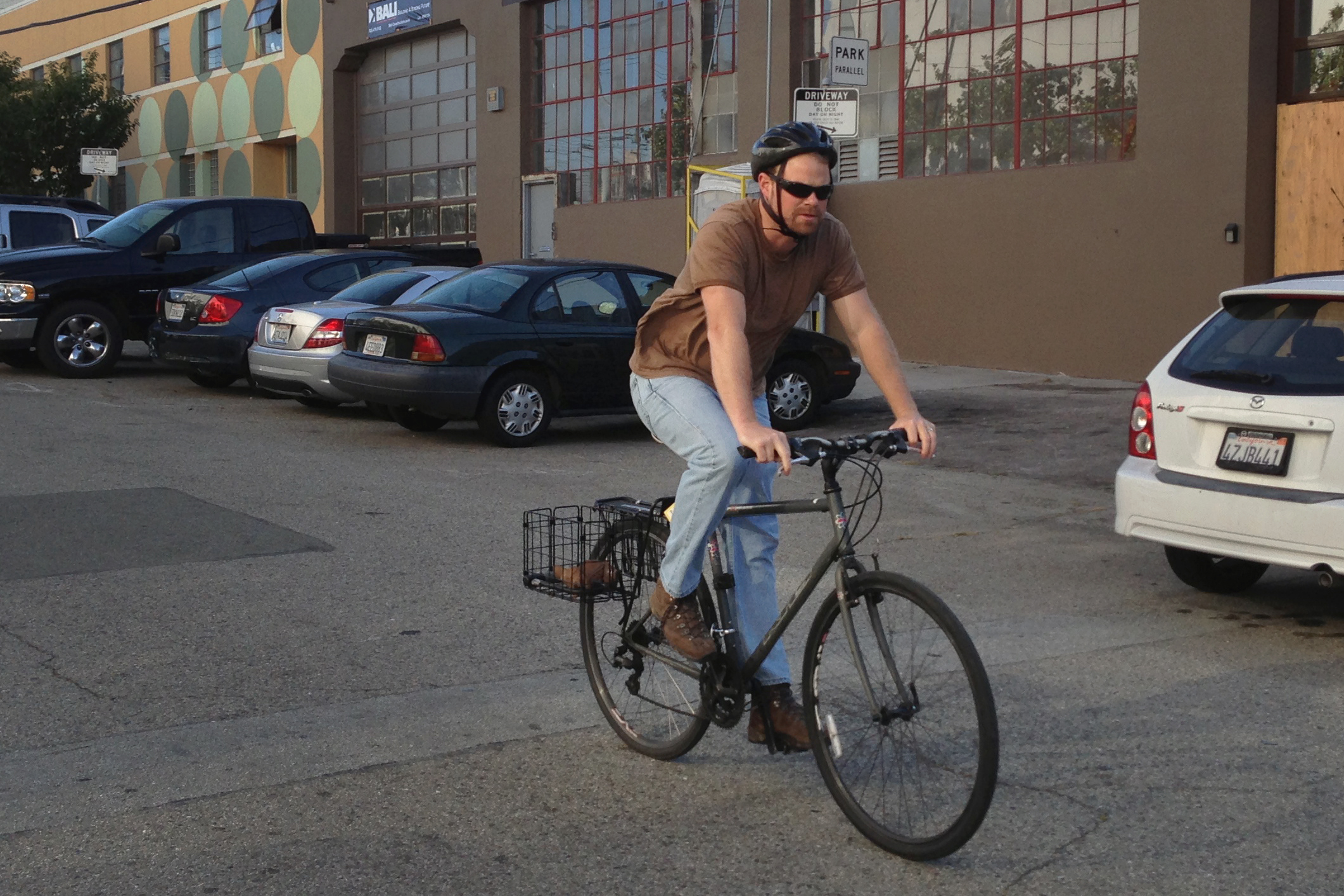29 July 2013
Breaking news by bicycle: AGU’s Mass Media Fellow recounts chasing the news on two wheels
Posted by mcadams

Mike Osborne, AGU’s 2013 Mass Media Fellow, is spending his fellowship in the KQED newsroom in San Francisco, Calif. Photo by: Dione Rossiter, American Association for the Advancement of Science (AAAS).
By Mike Osborne
The news broke around 4:00 p.m. on Fri., June 30. I was sitting at my desk at KQED (San Francisco’s local NPR affiliate) when the office began to buzz. Editors and producers were literally running around the office.
Most of the reporters had already left for the weekend. I was about to head home myself when my producer and mentor, Molly Samuel, turned to me and said, “There’s breaking news – same sex couples are lining up at San Francisco’s City Hall. Would you be interested in recording interviews?”
The next thing I knew, I was riding my commuter bike, equipped with a microphone. Just two days earlier, on June 28, the U.S. Supreme Court ruled on two cases that paved the way for same sex couples to be legally married in California. Though it was expected couples would have to wait at least 25 days for the state to lift the ban prohibiting same sex marriages, California’s 9th Circuit Court lifted the ban just two days later. The state was suddenly free to issue licenses. The typically lethargic Friday evening newsroom was jolted awake.
I’m not usually a reporter – I’m a geology Ph.D. student on track to finish my degree this fall. But this summer I’m working for 10 weeks as AGU’s Mass Media Fellow. The fellowship program, offered by the American Association for the Advancement of Science (AAAS), places science students alongside reporters to work in newsrooms across the country each summer. Even though this breaking news is not the kind of story science fellows are typically assigned, I couldn’t resist the opportunity to be part of the action.
I peddled toward San Francisco’s Castro district. The Castro has a long history of gay rights activism so it seemed like a good place for person-on-the-street interviews. San Francisco was in the midst of an unusual heat wave, and I was biking (uncomfortably) in my blue jeans. When I got to the Castro I was a sweaty mess. I parked my bike, primed my recording equipment, and started looking for people to interview.

Osborne hopped on his commuter bicycle to cover some breaking news in San Francisco a few weeks ago as part of his fellowship. Photo credit: Joshua Cassidy, KQED/Quest.
This was my first experience with person-on-the-street interviews. The idea of approaching strangers to ask them their opinions about same sex marriage felt awkward and weird. But I had to come back to the studio with something, so I forced myself to start talking to people. Over the next 15 minutes I recorded four short interviews. When I thought I had something good, I packed up the equipment, and I was back on my bike by 5:35 p.m.
My ride to the studio was downhill and I was back in the office in ten minutes. Molly listened to the first three interviews, shaking her head. When she got to the fourth interview, she said, “Oh yeah—that’s the one.” She typed up a script and sent it to the news desk. Then, we turned on her radio to listen for the news.
At 6:02 p.m. – about two hours after the news first broke – we heard the news anchor say, “Breaking news at city hall tonight…” A few seconds later, we heard an edited version of the interview I’d recorded less than an hour earlier. The woman I’d interviewed said “It looks like I’ll be going to a lot of weddings soon. I’m looking forward to all the cake. Honestly, I feel proud to be an American today.” The clip lasted 17 seconds, and it was my first radio story at KQED. I finally felt like I was fulfilling my role as a reporter.
Working as a reporter is exciting. And one thing that’s struck me is that there are surprising similarities between science and journalism. Both professions are devoted to creating and disseminating information. Both strive for that elusive standard of objectivity. If you want to get really idealistic about it, both involve the pursuit of truth.
I love communicating science and I’m grateful to AAAS and AGU for giving me a summer full of stories.
— Mike Osborne is AGU’s 2013 Mass Media Science and Engineering Fellow. He is spending his 10-week fellowship at KQED in San Francisco, Calif. Click here to read his blog from the KQED newsroom. Osborne, who is a co-creator and producer of the Generation Anthropocene podcast, is a Stanford University Ph.D. student of paleoclimatology.










 The Plainspoken Scientist is the science communication blog of AGU’s Sharing Science program. With this blog, we wish to showcase creative and effective science communication via multiple mediums and modes.
The Plainspoken Scientist is the science communication blog of AGU’s Sharing Science program. With this blog, we wish to showcase creative and effective science communication via multiple mediums and modes.